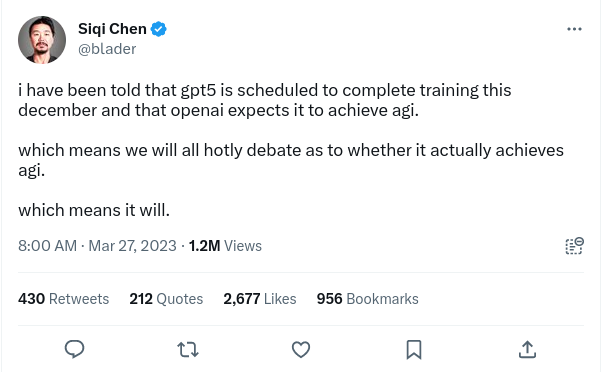Will There Be a ChatGPT-5?
It doesn’t seem that long ago that GPT-3 and GPT-3.5 came roaring on the scene, promising change on a massive scale. Just a few months later, OpenAI, the company behind the generative AI, presented GPT-4, the next iteration of the chatbot. Speculation has run rife since about whether there will be a GPT-5, its release date and what it will be able to do.
The answer isn’t exactly clear cut: at time of writing, the rumor mill is working overtime with journalists, commentators and random dudes chiming in to give their opinion on what GPT-5 can do, when it will come out and, of course, predicting the end of all humanity. What is the truth to these claims and theories, though, and what do we know for sure?
Rumors of GPT-5
Turns out, very little. What got the discussion top hit fever pitch was a tweet sent out by Siqi Chen, a tech CEO and AI investor, on March 27th, 2023 in which he claimed that OpenAI was getting GPT-5 ready by December of 2023. On top of that, Mr. Chen claimed it would be close to an artificial general intelligence, an AI that replicate human tasks — so an AI that can more or less think like a human.

This tweet hit like a bomb in the AI sphere, with Reddit threads and articles popping up like mushrooms after a rainstorm. These discussions all centered around whether OpenAI could release GPT-5 that early, what an AGI could do and what that would mean for humanity.
However, it should be noted that all of this — and we’re talking dozens of articles published all over the web, plus all the social media discussions — was based on this one tweet and its follow-up comments.
Though Mr. Chen can be treated as a relatively credible source since he seems to know a lot of people working on AI — despite himself running a company making financial software — it still seems odd that this much frenzy was caused by just one tweet. We’ll leave that question to the academics, though.
OpenAI’s Plans
Considering how OpenAI is notoriously close-mouthed about what its plans are, it’s not surprising that speculation runs rife. However, a few weeks after Mr. Chen’s tweet, word did come from on high about the company’s plans for GPT.
In a MIT discussion on April 14, 2023, presenter Lex Fridman asked OpenAI CEO Sam Altman about an open letter signed by AI researchers and tech luminaries asking that AI companies and in particular OpenAI pause work on future projects– in essence GPT-5. In his reply, which you can see here, Altman stated that his company was not working on GPT-5, nor would it be “for some time.”
That seems to seal the matter, then: there’s no GPT-5 in the works, at least not in any concrete way. That doesn’t mean OpenAI’s researchers are sitting around doodling in their notebooks and clapping erasers together, though. Altman’s statement leaves a lot of room for him and his company to work with.
The Future of GPT
While OpenAI may not be working on the next iteration of GPT, that doesn’t mean that GPT-4, the current iteration, is done with. Most likely, like with its predecessor, we’ll get a “half” version, so we wouldn’t be too surprised if there’s a GPT-4.5 coming out sometime in this year or early in the next.
Naturally, speculation is running rife with what GPT-4 and ChatGPT-4.5 will be able to do in the near future. Again, OpenAI’s tendency to play its card close to its chest is fueling the fire rather than extinguishing it. For example, when it released GPT-4, it came with technical specs that actually don’t tell us much of how it does what it does.
As a result, it’s hard to predict what GPT-4 will look like even a month or two now. A few weeks ago OpenAI surprised us with a plugin that lets you connect GPT-4 to the web, letting it scour data that way. This was a huge leap in the way we let the AI interact with the world, and it could be that OpenAI’s next announcement will be the same type of bombshell.
What Would GPT-5 Look Like?
However, with more and more companies entering the AI space and putting together their own generative AIs, it’s likely OpenAI will soon start work on a new generation of AIs besides improving the current one. Though GPT-5 is likely not happening this year or even the next — though don’t hold us to that — chances are somebody at OpenAI has at least a few ideas of what it would look like, as Mr. Chen suggested.
A few things that have been rumored is that GPT-5 will take the progression we’ve seen from GPT-3.5 to GPT-4 and extend it even further. So, where GPT currently can accept images as input, the next generation could use video. GPT5 will likely be even more creative than GPT-4, maybe even close to human.
Naturally, this raises the specter of an AGI and all the scenarios — good and bad — that come with it. Whether that will happen only time will tell.